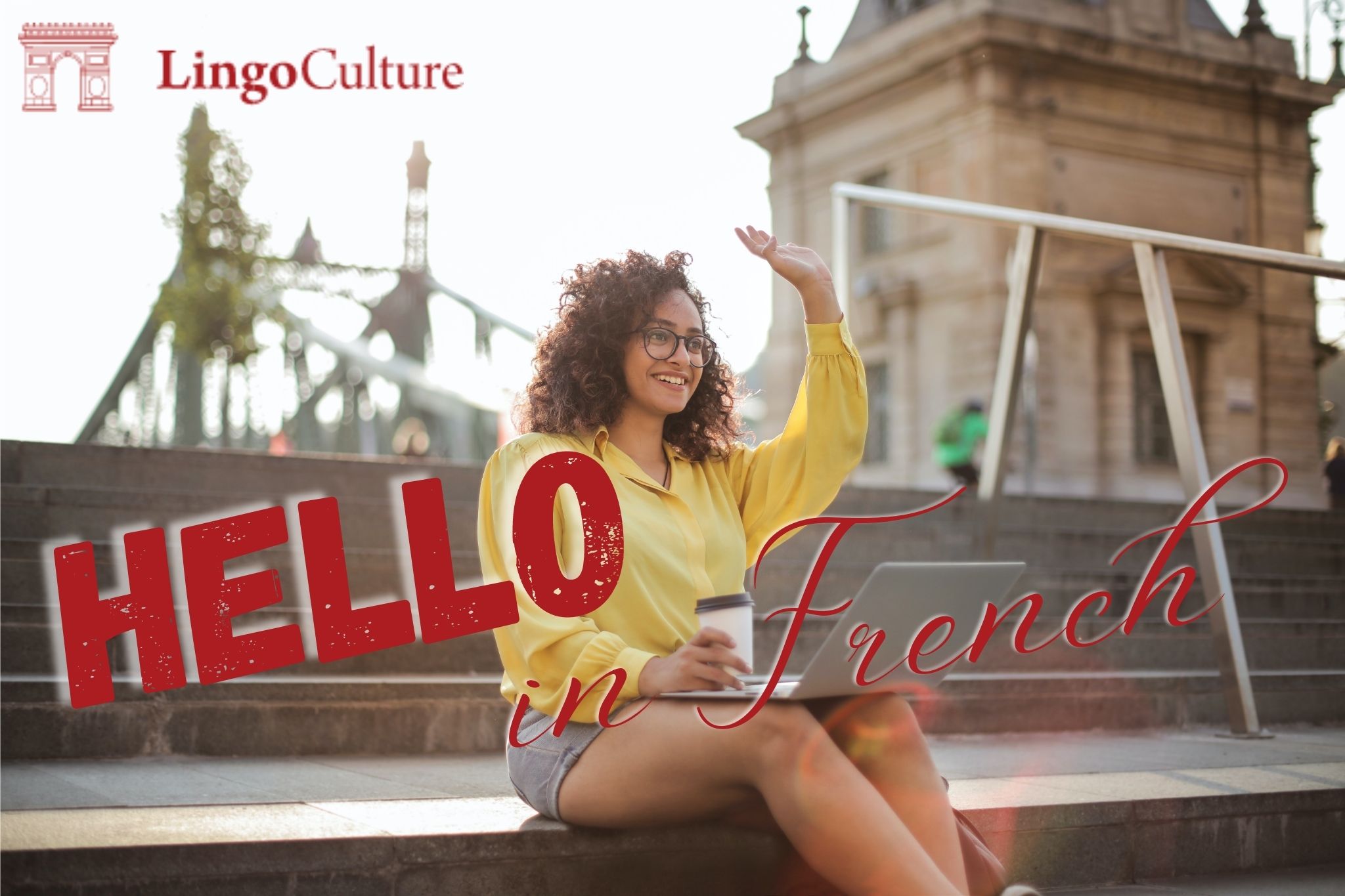Hello in French: 10 French greetings for every situation

Get our free email course, Shortcut to Conversational.
Have conversations faster, understand people when they speak fast, and other tested tips to learn faster.
More infoKnowing the right way to say hello in French is one of the most important steps in your journey to mastering the language. A simple hello (bonjour !) can unlock so many conversations and pave the way for new experiences and friendships.
There are lots of different ways to say hello in French, each with its own meaning, use, and formality. By knowing the differences between them, you can make sure you start your conversations on the right foot, no matter the situation.
In this post, we’ll explore ten different French greetings, including the ins and outs of when to use them. We’ll also look at an example for each and what you might say in response, from the classic bonjour to the playful coucou. Let’s jump straight in!

This post is presented by LingoCulture, the number one way to learn French online.
LingoCulture students get access to unlimited 1-on-1 French classes with 50+ native teachers via video chat for $197/mo. Click here to start your 7-day trial for $1 today.
Bonjour
Hello, Good day
Let’s start with the staple of French greetings: bonjour. A safe and polite option, bonjour can be used both formally and informally. In fact, you can use it in almost every situation, whether you’re delivering a presentation, meeting your partner’s parents, or bumping into your old friends.
Most people will already recognize bonjour as how you say hello in French, but eagle-eyed learners might also spot that it literally translates to good day. It can be translated as both, as well as good morning and good afternoon. Note that while it can be tempting to translate good morning in French as “bon matin,” or good afternoon as “bon après-midi,” neither of these are really used. If you want to sound like a local, it’s better to stick with the classic bonjour instead.
- Bonjour, Mme Dubois! / Bonjour, Marie. – Hello, Mrs Dubois! / Hello, Marie.
- Bonjour, as-tu déjà pris ton petit déjeuner ? – Good morning, have you already had your breakfast?
Rebonjour
Hello again
What do you say if you bump into somebody twice in one day? You take the chance to show off a specific French greeting, of course!
Rebonjour is a re-do of your initial bonjour, used to greet somebody that you’ve already recently said hello to. While it may not be the most common way to say hello in French, it’s certainly important, as it can be considered impolite to say bonjour again if you’ve already greeted someone earlier in the day.
- Rebonjour ! Je suis là de nouveau ! – Hello again! I’m back!
Bonsoir
Good evening
As we head into the evening, bonjour moves over to make room for bonsoir, which means good evening in French.
For native English speakers, good evening may feel a little formal, but in French, it’s extremely common. Much like its daytime counterpart, bonsoir is appropriate for everybody and every circumstance.
If you’re met with bonsoir simply repeat it back, and then continue the conversation.
- Bonsoir, Marie ! Comment ça va ? / Bonsoir, Camille. Bien, et toi ? – Evening, Marie! How are you? / Hello, Camille. All good, and you?
Salut
Hi, Hey
Salut is a more informal way to say hello in French. It’s really more like hi in French, or even hey. Casual and relaxed, this French greeting is best used with friends, family, or people you know – and not, say, at a job interview!
Interestingly, salut can also mean bye or bye-bye, so you can use it both to start and to wrap up your conversation. For more options on taking your leave, check out our other post with a fun list of expressions for how to say goodbye in French.
- Salut, les gars! Ça va ? – Hey guys! How’s it going?
- Salut ! À la prochaine ! – Bye! See you next time!
Ça va ?
How’s it going ?
Almost as famous as bonjour, ça va can be used in the same way as the English how are you? or how’s it going? More informal, this is mostly used between friends or people who know each other well, like colleagues.
The literal translation of ça va ? in English is it goes? or it’s going?. The longer version of this same expression is comment ça va ?, with a better literal translation: how it goes? or how’s it going?
Don’t expect an in-depth response to this question! Similar to English, this question is often superficial. Just as you might reply fine in English, short positive answers, like ça va or oui, ça va are quite common.
- Ça va ? / Oui, ça va. Fantastique, merci. Et toi? – How’s it going? / It’s going great, thanks. And you?
- Comment ça va? Ça va, merci. – How are you? / Fine, thanks.
Of course, just as there are many ways to say hello in French, there are also lots of ways to ask someone how they are. To explore them all, take a look at this LingoCulture post with ten more expressions to ask “How are you?” in French.
Coucou
Hi there!
The most informal French greeting in this list, coucou can be loosely translated as hi there. Fun and friendly, you’ll hear this playfully said between friends of all ages and especially when people are calling to babies and children.
It’s important to remember that because of its informality, some French adults prefer to stick to more traditional French greetings. Only use it with people you’re very familiar with!
- Coucou, il y a quelqu’un? – Hi there, is anyone there?
Quoi de neuf ?
What’s new?, What’s up?
What’s up, doc? Or, if you’re watching the French version of Bugs Bunny, quoi de neuf, docteur ?
That’s right: in terms of use and formality, quoi de neuf is such a good option for what’s up in French that Bugs Bunny opted for it as his French catchphrase.
Casual and informal, quoi de neuf directly translates to what’s new, making it a great question to ask to make small talk. Just like in English, people often ask it expecting a brief response, so be sure to give a short answer in reply.
- Bonjour Marc, quoi de neuf? / Rien de trop. – Hello Marc, what’s new? / Nothing much.
- Salut, quoi de neuf? / Je suis fatigué. / Ah, moi aussi. – Hiya, what’s up? / I’m tired. / Me too.
Bienvenue
Welcome
You might find that when you walk into a shop in France, you’ll be greeted with bienvenue. This literally means welcome, so it’s only to be used when the situation calls for it – for example, greeting a friend that you’ve invited to your house at the door.
If you’re met with a bienvenue, you can either respond with a smile and a merci, or, as always, stick to your classic bonjour.
- Bienvenue ! / Bonjour ! – Welcome! / Bonjour!
Allô
Hello!
Did you think we didn’t say hello in French? Think again!
A more recent addition to the French language, this French greeting is slightly different in that it’s almost exclusively used over the phone. Said with a rising inflection like you would to ask a question, you might use allô to say hello as you answer a call or to check if the other person is still there.
- Allô ? / Allô, c’est Michel. Pierre est là? – Hello? / Hello, it’s Michel. Is Pierre there?
- Allô ? Tu es toujours là ? – Hello? Are you still there?
Enchanté(e)
It’s a pleasure to meet you
Strictly speaking, this isn’t a French greeting, but it’s such a famous element of French culture that we couldn’t resist including it. Literally translating to enchanted, enchanté means pleased to meet you. You can use it to say hello in French when you’re meeting somebody for the first time in a more formal atmosphere or after you’ve been introduced.
Note that since enchanté is an adjective, women will need to add an -e at the end to match their gender. See this in our example:
- Bonjour, je m’appelle Benjamin. / Enchantée Benjamin, je suis Sarah. – Hi, I’m Benjamin. / Pleased to meet you Benjamin, I’m Sarah.
Conclusion: Hello in French for every situation
There you have it – ten different ways to greet somebody in French!
Remember, the most important thing is to pick the right greeting to match the formality of the situation. If you’re walking into a job interview, you’ll want to stick to bonjour rather than the more informal salut. On the other hand, you wouldn’t say quoi de neuf to a newborn baby – but coucou would definitely fit the bill!
What’s more, you’ll want to make sure your French greeting is appropriate in the context. There’s no use saying bienvenue if you’re not welcoming anybody, for example, while bonsoir only makes sense in the evening.
We hope that you’re confident to pick and choose the right French hello for every situation. After all, you now have ten to choose from!
If you want a list with ways to say both hello and goodbye in French, we took inspiration from this LingoCulture post on French greetings. If you’re interested in Spanish greetings, we have a similar post here on BaseLang, including lots of regional slang for “what’s up?” in Spanish.
To wrap up, we’ll leave you with our list of French greetings for easy reference. Salut!
| Bonjour | Hello, Good day |
| Rebonjour | Hello again |
| Bonsoir | Good evening |
| Salut | Hi, Hey |
| Ça va | How are you?, How’s it going? |
| Coucou | Hi there |
| Quoi de neuf? | What’s up?, What’s new? |
| Bienvenue | Welcome |
| Allô | Hello (over the phone) |
| Enchanté(e) | Pleased to meet you |


